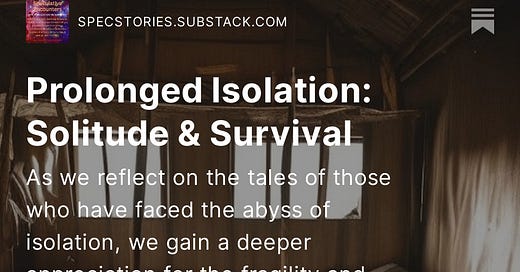Prolonged Isolation: Solitude & Survival
As we reflect on the tales of those who have faced the abyss of isolation, we gain a deeper appreciation for the fragility and resilience of the human psyche.
the Psychological Effects of Prolonged Isolation
Introduction
In the annals of human history, tales of survival against all odds have often captured our imagination. Yet, beneath the surface of these narratives lies a facet that is seldom explored – the profound psychological effects of prolonged isolation. While many post-apocalyptic stories touch on the emotional toll of isolation, diving deeper into the intricacies of how individuals and communities grapple with extended periods of solitude reveals a realm of emotions, coping mechanisms, and mental health challenges that demand our attention.
The Isolation Paradox
The allure of solitude, ironically, often clashes with the harsh realities it brings. As the world retreats into itself after a global catastrophe, individuals find themselves thrust into an unfamiliar world devoid of human interaction. The initial novelty of having time alone is juxtaposed with the creeping realization of the absence of companionship. The emergence of new social norms, too, plays a pivotal role in shaping the psychological landscape of isolation.
Strategies for Maintaining Mental Well-being
Survivors thrust into isolation often embark on a journey to maintain their mental well-being. Creating a routine becomes a lifeline in the chaos, offering a sense of structure and predictability. From setting aside time for exercise and mindfulness practices to engaging in creative pursuits, individuals navigate isolation by carving out moments of purpose and accomplishment.
A prime example is the story of Emily, who found herself isolated in a remote cabin for years after a global catastrophe. Facing the daunting prospect of solitude, she devised a meticulous routine involving tending to a small garden, journaling her thoughts, and practicing meditation. These activities not only provided her with a sense of purpose but also served as outlets for her emotions, ultimately aiding in her emotional resilience.
Unconventional Bonds: Relationships with the Environment
Isolation often prompts survivors to forge unique relationships with their environment. The wilderness becomes more than just a backdrop; it transforms into a confidant, a friend, and even a source of spiritual connection. The concept of anthropomorphism – attributing human characteristics to non-human entities – becomes a coping mechanism, allowing individuals to alleviate feelings of loneliness.
Consider John, a survivor who spent years isolated in a desolate desert. He personified the wind as a comforting presence, finding solace in its whispers and gusts. The shifting sands became his canvas, and his footprints told stories of his resilience. Such connections highlight the human spirit's innate ability to seek companionship in the most unexpected places.
Navigating Mental Health Challenges
However, the human mind is not impervious to the toll of isolation. Prolonged separation from social interactions can lead to a cascade of mental health challenges. The absence of interpersonal communication can trigger feelings of loneliness, anxiety, and even depression. The line between solitude as a conscious choice and isolation as an involuntary circumstance becomes blurred, and survivors must grapple with their emotional fragility.
Experts suggest that establishing communication networks, even if limited, can significantly alleviate the burden of isolation. Virtual connections, such as radio broadcasts or written messages left at designated locations, can serve as lifelines, reminding survivors that they are not truly alone.
Conclusion
In the wake of global catastrophes, stories of survival take on new dimensions when we explore the psychological effects of prolonged isolation. The interplay between solitude, coping mechanisms, and mental health challenges paints a nuanced portrait of the human experience. From crafting routines that offer a semblance of normalcy to forging profound bonds with the environment, survivors navigate uncharted territories of the mind.
As we reflect on the tales of Emily, John, and countless others who have faced the abyss of isolation, we gain a deeper appreciation for the fragility and resilience of the human psyche. Their stories remind us that even in the darkest moments, the human spirit can find ways to flourish, adapt, and ultimately survive – not just physically, but emotionally as well.
Keep reading with a 7-day free trial
Subscribe to StoryAngles to keep reading this post and get 7 days of free access to the full post archives.




